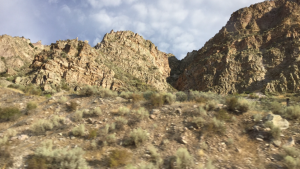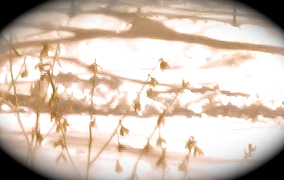(story by Bryan Fredrickson, seeker of the face of God)
Francis sat on the roughly hewn wooden bench with his back against the cabin facing the sun that chased away the night’s chill. The cabin was a simple and peaceful place. It was a place where he came for solace. He called it his hermitage in the woods. He had everything he needed to be comfortable, but not so much as to detract from its rustic simplicity.
His breakfast consisted of a plate of hot biscuits which he had just removed from the oven and placed in front of him. Next to the biscuits were a pot of hot coffee and a plate of butter. Pine scent and birdsong suffused the air, wafting his prayers of thanksgiving toward the heavens.
His gaze fell lazily on the horizon as the biscuits melted in his mouth.
Suddenly there appeared the figure of a man emerging from the forest. As he came over the hill, Francis inspected him closely. He looked to be a man of about Francis’ age and build, but he moved with a limp as if one leg was shorter than the other. He was hunched from shouldering a large pack. Francis thought there was something about the man that he recognized but he could not put his finger on it.
When the man came within ear shot, Francis beckoned him to sit and rest on the bench. The man sat down heavily, unloading his pack from his shoulder. It hit the ground stirring the dust. The man sighed and stared up at the deep blue sky as if uttering a silent prayer. His hair and beard were unkempt and his layered clothes were tattered. He smelled of earth and sweat. The sun exposed heavy wrinkles around his eyes and face. Again, Francis thought he recognized something about this man. Perhaps it was the man’s eyes, their hue or shape? He wasn’t sure. The man was silent but trained his eyes longingly on the plate of biscuits.
“Of course,” said Francis. “You must be terribly hungry.”
The man stretched out his hands to accept the buttered biscuit from Francis. They were calloused with dirt imbedded in their creases and fixed under his nails. Francis thought their shape and size bore a strong resemblance to his own. Francis fetched another mug from the house and poured the man some hot coffee.
It was evident to Francis that the man did not want to talk. So they ate in silence, communing like two old cats in the sun that had sized each other up and decided neither was a threat to the other. Time passed as the moments seemed to fold in on themselves and melt away. Finally, the man heaved himself off the bench to stand, pulling his pack over his shoulder.
“Thank you,” he uttered, breaking the silence in a voice strangely familiar to Francis.
“May I ask your name?” Francis queried.
“I am called the Wanderer,” he answered. “I look for people who need a doctor.”
With that he slowly limped away over the hill. Francis’ eyes followed him until he disappeared into the woods.
All day long Francis pondered what the man had said. Why had he come to him? Was he sick somehow, he wondered. It seemed to him that it was the man, rather than he, who was in need of succor. He remained perplexed as he crawled under his warm comforter to go to sleep. That night the Wanderer visited Francis in a dream. Looking deeply into Francis’ eyes he said, “Lo, I am with you always even to the end of the Age!”
Francis bolted upright in bed, peering into the darkness suddenly illumined by epiphany. Now he understood who the Wanderer was. He was every man, woman and child who is a victim of ill circumstance: the tired, the oppressed, the poor, the sick, the bereft, the lost, the disadvantaged, the unemployed, the orphan, the homeless, the friendless, the lonely, the judged, those who can’t catch a break in life and those whose addictions destroy the chances they are given. Francis knew what he recognized about the man. He had seen himself but without the trappings of comfort and ease. He had been given a chance to see himself born into the dark, cold lonely edges of society. The Wanderer was indeed a physician, opening the eyes of those who are blind to the suffering all around.
Francis recalled the first words the man had spoken to him. “Thank you,” he had said. It is a prayer offered when outstretched hands of one in need are met by the hands of one who gives what one is able. It is a prayer that reverberates across temporal time and place, even to the little town of Bethlehem where once the cry of a poor, cold child lying in a feeding trough echoed through the ages.
“I was blind,” Francis whispered to himself in the darkness. “But now I see!”


